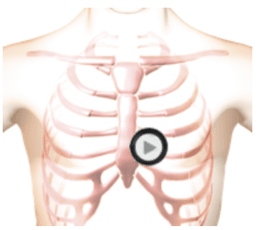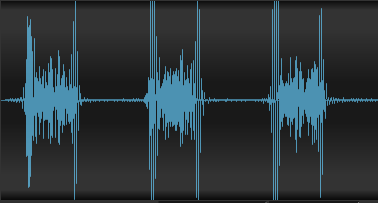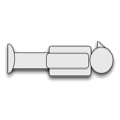Tricuspid Regurgitation - Severe | #102
This is an example of severe tricuspid regurgitation which is caused by degeneration of the tricuspid valve leaflets. The first heart sound is normal. The second heart sound is unsplit. There is a loud, rectangular, pansystolic murmur. There is a brief, rumbling, diamond-shaped diastolic murmur. In the anatomy video you can see the enlarged right atrium and right ventricle. You can see the turbulent blood flow from the right ventricle into the right atrium. This is the systolic murmur. You can see the brief turbulent blood flow from the right atrium to the right ventricle in diastole. This is caused by too much blood in the right atrium which forces blood back into the ventricle during diastole producing the flow rumble. To differentiate tricuspid regurgitation from mitral regurgitation, the maximum intensity of the tricuspid murmur is heard at the left lower sternal border. In addition, the murmur intensity increases with inspiration.Auscultation Sounds


Patient Recording


Patient Recording - Half Speed


Position

The patient's position should be supine.
Listening Tips
Systole:Loud, pan-systolic murmur, louder during inspirationDiastole:Brief, rumbling diamond shaped murmur may follow pan-systolic murmur in some cases
Waveform (Phonocardiogram)
Observe Cardiac Animation
Review the animation. Observe the enlarged right atrium and right ventricle.
You can see the turbulent blood flow from the right ventricle into the right atrium. This is the systolic murmur.
Notice the brief turbulent blood flow from the right atrium to the right ventricle in diastole. This is caused by too much blood in the right atrium which forces blood back into the ventricle during diastole producing the flow rumble.
To differentiate tricuspid regurgitation from mitral regurgitation, the maximum intensity of the tricuspid murmur is heard at the left lower sternal border. In addition, the murmur intensity increases with inspiration.
Authors and Sources
Authors and Reviewers
- EKG heart rhythm modules: Thomas O'Brien.
- EKG monitor simulation developer: Steve Collmann
-
12 Lead Course: Dr. Michael Mazzini, MD.
- Spanish language EKG: Breena R. Taira, MD, MPH
- Medical review: Dr. Jonathan Keroes, MD
-
Heart sounds and mentorship: W. Proctor Harvey, MD
- Medical review: Dr. Pedro Azevedo, MD, Cardiology
-
Last Update: 1/8/2023
Sources
-
Electrocardiography for Healthcare Professionals, 5th Edition
Kathryn Booth and Thomas O'Brien
ISBN10: 1260064778, ISBN13: 9781260064773
McGraw Hill, 2019 -
Rapid Interpretation of EKG's, Sixth Edition
Dale Dublin
Cover Publishing Company -
12 Lead EKG for Nurses: Simple Steps to Interpret Rhythms, Arrhythmias, Blocks, Hypertrophy, Infarcts, & Cardiac Drugs
Aaron Reed
Create Space Independent Publishing -
Heart Sounds and Murmurs: A Practical Guide with Audio CD-ROM 3rd Edition
Elsevier-Health Sciences Division
Barbara A. Erickson, PhD, RN, CCRN - Clinical Heart Disease
W Proctor Harvey, MD
Clinical Heart Disease
Laennec Publishing; 1st edition (January 1, 2009) -
The Virtual Cardiac Patient: A Multimedia Guide to Heart Sounds, Murmurs, EKG
Jonathan Keroes, David Lieberman
Publisher: Lippincott Williams & Wilkin)
ISBN-10: 0781784425; ISBN-13: 978-0781784429 - Project Semilla, UCLA Emergency Medicine, EKG Training Breena R. Taira, MD, MPH
Tricuspid Regurgitation - Severe | #102